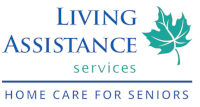Every day I get to witness firsthand just how much our caregivers love what they do. It’s not an easy job by any stretch, but they wouldn’t give up their clients for anything.
A recent home renovation show reminded me again of not only of how special clients are to professional caregivers, but also just how special caregivers become to the person receiving care and their families.
In the show, singer Michael Bublé honored his late grandfather Demetrio’s final wish by renovating and gifting his former house to the caregiver, Minette, who had cared for him in his final years.
Throughout the episode, both Bublé and Minette talked about the special bond that developed between his grandfather and his caregiver.
It was heartwarming to hear how the grandfather – who’d been reluctant to receive in-home care and fought it tooth and nail – eventually grew to love his caregiver and how they became part of each other’s families.
While being gifted a house isn’t all that common, the special relationships between caregivers and care recipients is.
How everyone benefits of in-home care
Caregivers enjoy numerous benefits from taking care of others and it turns out that the person receiving care reaps many of those same benefits.
Here are just some of the benefits of being a professional caregiver that care recipients and their families also enjoy:
- Flexibility – Caregivers enjoy flexibility so that they’re able to work while also raising children, taking care of family, and often attending school (usually nursing). By hiring an in-home care provider, the spouses or children of the care recipient are also able to better juggle their other responsibilities while ensuring their loved one is cared for.
- Close relationships – Caregivers work closely with their clients, usually on a daily basis, often for years. During this time, they form close connections with the care recipient and their family members and these deep connections have benefits for all involved. The physical and mental health benefits of deep connections and friendships are well documented and include everything from lower stress and anxiety to improved immunity, and even a longer life! There’s also evidence that Alzheimer’s patients who share close relationships with their caregivers experience a slower decline in brain function, similar to the benefits achieved from some drugs used to treat the disease.
- Better care – Great in-home care is made even better as the caregiver gets to know the care recipient and their family. This strong connection gives the caregiver a better understanding of the client and their needs so that they’re able to provide the best possible care. Everyone benefits from this! In turn, family members can pick up tips along the way that improve their skills when helping care for their loved one.
- Giving back to society – Caregivers give back in so many ways. By doing what they do, clients are able to age in place safely and happily. Caregivers are also a godsend for the client’s family who are able to recharge and look after themselves while knowing their parent/grandparent is looked after. But the person providing the care isn’t the only one who’s giving back – people who hire a caregiver are also doing something wonderful! By hiring a great worker you’re helping her/him support their family. In turn, the caregiver is able to earn a good living and provide for their family, while also working with someone they respect and admire.
The Right Caregiver
The caregiver and care recipient bond is a special one that provides endless benefits for all involved. For this reason, we encourage our clients to choose their caregiver for the best possible fit.
If you’re considering in-home care for your aging loved one or yourself, give us a call to learn more. Excellent care, trust, and lasting connections are just a phone call away.
Article sources
Close Caregiver Relationship May Slow Alzheimer’s Decline. (2020). John’s Hopkins Medicine. https://www.hopkinsmedicine.org/news/media/releases/close_caregiver_relationship_may_slow_alzheimers_decline
Connect To Thrive. (2012). Seppälä E. https://www.psychologytoday.com/us/blog/feeling-it/201208/connect-thrive

